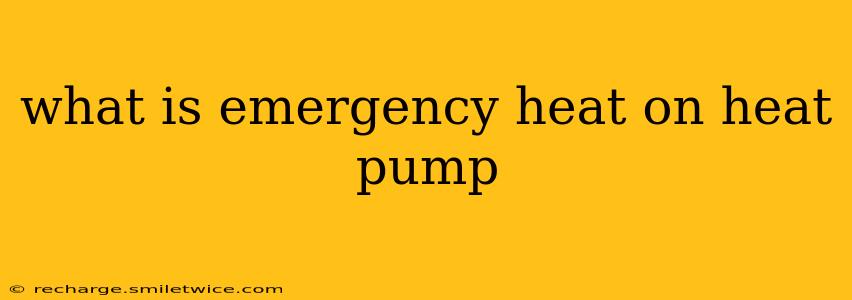Heat pumps are incredibly efficient heating and cooling systems, utilizing a refrigerant cycle to transfer heat rather than generating it directly like a furnace. However, when temperatures plummet significantly, heat pumps can struggle to provide adequate warmth. This is where the "emergency heat" setting comes in. This article will explore what emergency heat is, how it works, when to use it, and its implications for energy consumption.
What Does Emergency Heat Do?
Emergency heat is essentially a backup heating system built into most heat pumps. Unlike the standard heat pump operation, which uses a refrigerant cycle to extract heat from the outside air, emergency heat utilizes electric resistance heating elements. These elements are similar to those found in traditional electric space heaters. Think of it as a last resort when your heat pump's primary heating function isn't enough to maintain a comfortable indoor temperature.
How Does Emergency Heat Work?
When the heat pump's refrigerant cycle struggles to extract sufficient heat from the outside air (typically when temperatures are extremely low), the system switches to emergency heat. This engages the electric resistance heating elements located within the indoor unit (air handler). These elements directly convert electricity into heat, warming the air that's then circulated throughout your home.
When Should You Use Emergency Heat?
You should only use emergency heat when your heat pump's standard heating mode isn't sufficient to keep your home warm enough. This is usually during periods of extremely cold weather. You'll often notice that your heat pump will automatically switch to emergency heat when the outside temperature drops below a certain threshold, which varies depending on the specific model and manufacturer. You may also manually select emergency heat if you feel your home isn't warming up adequately.
Is Emergency Heat Expensive to Run?
Yes, emergency heat is significantly more expensive than standard heat pump operation. Because it uses electric resistance heating, it's much less efficient than the refrigerant cycle. Electric resistance heating converts all the electricity consumed directly into heat, resulting in a much higher energy bill. It's generally recommended to avoid prolonged use of emergency heat unless absolutely necessary.
How Much More Expensive is Emergency Heat?
The exact cost difference depends on your electricity rates and the duration of emergency heat use. However, it's not uncommon for emergency heat to cost 3 to 5 times more than standard heat pump operation. This significant increase in energy consumption can lead to a substantial jump in your energy bills.
How Can I Reduce Reliance on Emergency Heat?
Several strategies can minimize your reliance on emergency heat and save you money:
- Proper Heat Pump Maintenance: Regular maintenance ensures your heat pump is operating at peak efficiency. This includes cleaning or replacing air filters, checking refrigerant levels, and inspecting the outdoor unit for obstructions.
- Improve Home Insulation: Better insulation reduces heat loss, allowing your heat pump to work less hard to maintain a comfortable temperature. Consider upgrading insulation in your walls, attic, and floors.
- Seal Air Leaks: Caulk and weatherstrip windows and doors to prevent drafts and heat loss.
- Programmable Thermostat: A programmable or smart thermostat allows you to optimize your heating schedule and reduce energy usage when you're away from home or asleep.
Why is My Heat Pump Using Emergency Heat Frequently?
If your heat pump frequently switches to emergency heat, even when temperatures aren't extremely low, it may indicate a problem. Possible causes include:
- Low Refrigerant: Insufficient refrigerant reduces the heat pump's efficiency, leading to more frequent emergency heat usage.
- Frozen Coils: Ice buildup on the outdoor unit's coils can impair its ability to extract heat.
- Faulty Components: A malfunctioning compressor or other components can cause the heat pump to underperform.
- Incorrect Thermostat Settings: Ensure the thermostat is correctly set and operating properly.
In cases of frequent emergency heat usage, it's best to contact a qualified HVAC technician to diagnose and resolve the issue.
By understanding how emergency heat functions and implementing energy-saving measures, you can ensure your heat pump operates efficiently and effectively throughout the heating season, minimizing your reliance on this costly backup system.
